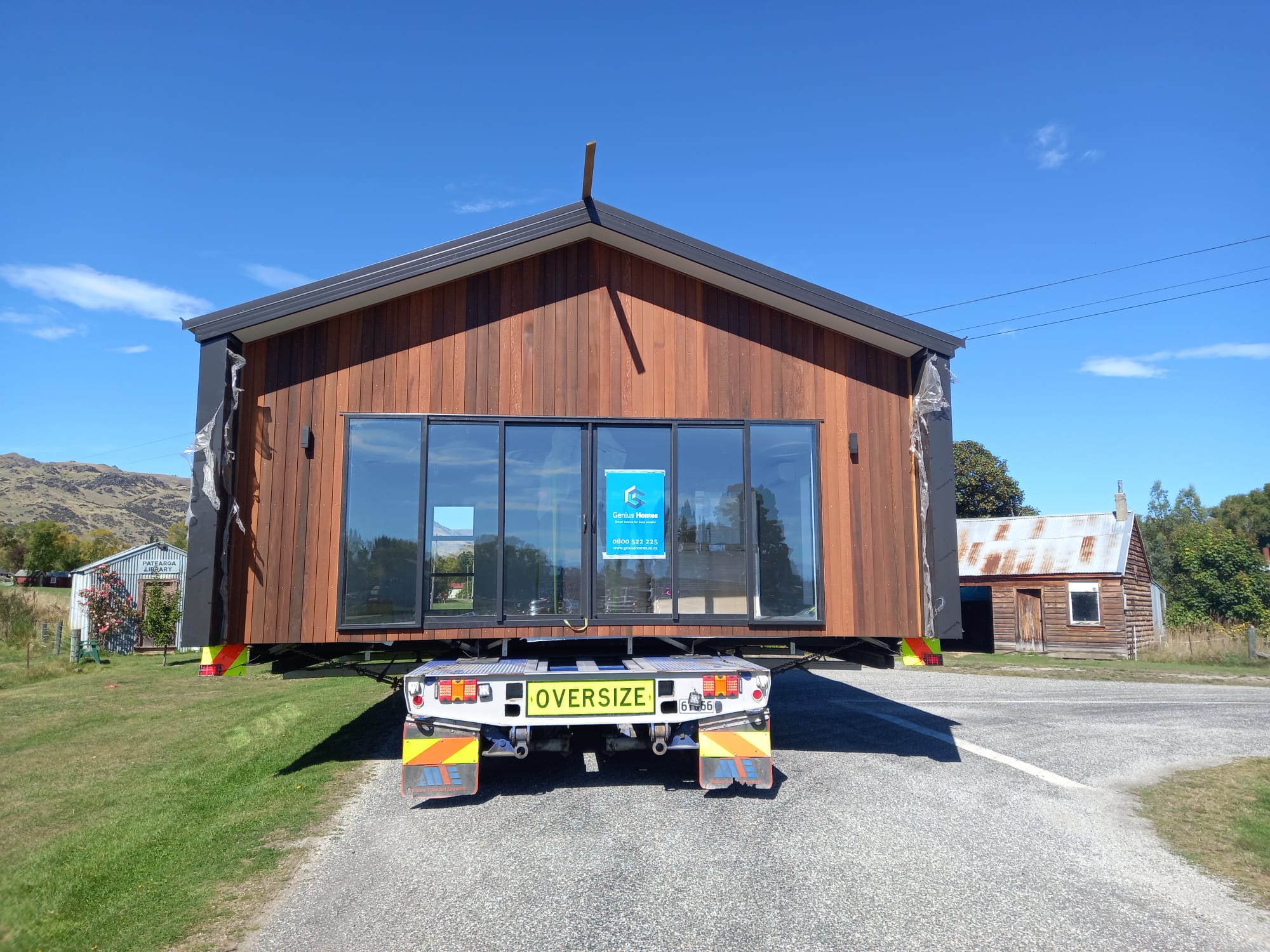What are the pros and cons of modular homes?
Modular homes have come a long way in recent years. While they used to be boxy and limited, these houses are now competing with traditional onsite construction. So what are the advantages of choosing a modular home?
With improved transport capabilities, better processes, and increased quality control, this innovative off-site construction method is on the rise. To help you decide if modular housing is right for you, we’ve unpacked all the pros and cons in this article.
What is a modular house?
Modular houses, also called modular prefabs, are built in sections in a factory, delivered to the site, and then assembled into one cohesive structure.
The process is as follows:
- Separate modules are constructed in the factory.
- Modules are transported individually on a truck.
- All modules are assembled and permanently fixed to the foundation.
- Site utilities are connected to the house.
- Sitework, decking, garages and baseboards.
- The house is ready for practical completion.
- Move in.
To help you decide if this approach suits your needs, we’ve outlined the pros and cons below.
Pros of modular homes
If an effortless building experience is what you’re looking for, the modular method should appeal. We’ve outlined the key advantages below:
Efficient
Modular prefabs are built off-site in a controlled factory with full project management which means the process is quick, predictable, and streamlined. For ultimate productivity, your prefab building company will take care of everything, from design to compliance to manufacturing. Then the house is delivered and installed on your site, ready for you to move in within a few weeks.
Minimal disruption to your site
With a modular house, you don’t have to worry about the noise, mess, and hassle of hosting a construction site. Whether you’re building farm accommodation or a second dwelling, simplicity is a huge advantage. With Genius Homes, all required site work could be completed in as little as four weeks.
Adaptable
Modular homes are designed to be assembled in various configurations, which makes them highly adaptable. You can easily add a room, or change the layout as needed because the house plans are already designed with these kinds of changes in mind. Speak to your builder about the full range of customisations.
Fewer delays
If you’ve ever built or renovated a home, you’ll know how frustrating delays can be. Fortunately, a modular build is much faster than conventional construction because there is no risk of weather slowing progress in the factory. That way, contractors and builders can work uninterrupted until the project is done.

Excellent resale value
While modular houses were previously considered less valuable than onsite-built homes, things have changed. Now, with stringent quality control and innovative techniques, the resale value is equivalent to traditional housing. With innovative techniques, these houses are virtually indistinguishable from their onsite-built counterparts.
Energy efficient
All new-build houses in New Zealand must comply with the Building Code, including those built with modular construction. And since November 2022, the H1 Energy Efficiency standards have increased, with higher R-values for insulation in all six climate zones. This guarantees your modular home will be warm, healthy, and dry, with a more affordable energy bill. All Genius Homes houses are built to thrive in the harshest conditions across the South Island so your house is built for even the coldest climates.
Simple compliance
To streamline the process, your modular building company will handle the entire compliance process for you. This is much simpler compared to onsite construction because the plans are already determined, eliminating the risk of unexpected complications.
Cost-effective
If you’re looking for a way to cut down the cost of your home without sacrificing quality, a modular prefab is the most effective solution. With lower labour costs, less travel time, and efficient manufacturing, modular houses are much more cost effective than traditional construction. For a full breakdown of our prefab pricing, see the article about prefab and modular homes NZ prices here.
Cons of modular homes
While there are some benefits, there are also some drawbacks to modular construction. We’ve outlined what you should consider below:
Finding the right section
To build a modular home, you first need to own a piece of land to install it on. This must be organised before construction begins and will often depend on your financial situation. If you aren’t sure about the suitability of a particular section, speak with Genius Homes about a site consultation and Geotech report.
.jpg?width=770&height=513&name=DSC_0569%20(1).jpg)
Limited design options
Since they are transported on a truck, modular homes are slightly more restricted in terms of layout, materials, and size. While a conventional house can sprawl further out around the site, a modular house must meet load regulations as laid out by the New Zealand Transport Agency.
Each section of the house must safely fit on an over-dimension transporter and most of our modular homes are Cat 3 or Cat 4 loads, which means we have to apply for an Over Dimension Permit from OPIA. Category 3 loads enable us to carry a load of between 4.5m and 13.3m up to 5m and 20m. A Category 4 load is upwards of those numbers but we still need to consider the logistical challenges, and access issues, that may arise from loads of this size. You’re also unable to transport a brick home, which may be an important factor in whether a module home is suitable for you.
Groundwork is additional
Before your house can be installed and connected to site services, you will need to arrange all the professional trades required to assess, conduct, and complete the groundwork. This includes preparing a driveway, foundations, landscaping, and utilities in advance so the modules can be put together upon delivery. In some cases, your modular home builders may manage the groundwork for you, but this will be added to the quote.
Financing for first-time buyers
Banks, other than Westpac, typically won’t provide a mortgage for a modular prefab because it’s not recognised as a house until it’s installed on the site. So, while the construction process is more affordable, first-time home buyers may struggle to lock in a contract. Fortunately, financing initiatives are emerging, like the exclusive partnership Genius Homes has with BNZ. Find out more about our prefab home loans here.
On-site construction vs modular houses NZ
So what’s better – modular or conventional homes?
While this is individual to each project, there are several key factors to consider. While many people opt for traditional construction out of habit, it is usually a much more expensive and drawn-out process. That’s because on-site construction is plagued by weather delays and more travel time, which all gets added to your bill.
For a modular house, the only time spent travelling to the site is the delivery day and a few short weeks on-site. This makes them a more cost-effective, efficient, and stress-free option.
Prefab homes vs modular homes NZ
While the terms ‘prefab’ and ‘modular’ are often used interchangeably, there is a slight difference. Prefab homes refer to any house that is built in a factory and delivered to the site. On the other hand, modular homes are a type of prefab with more than one section. These separate ‘modules’ are assembled and made weathertight on-site. In other words, all modular houses are prefabs, but not all prefabs are modular.
If you want all the benefits of prefab construction, but want a house plan that can’t fit on the truck in one piece, a modular is your best bet.
At Genius Homes, we have a wide range of prefab homes, including our popular modular Benmore design. Standard inclusions with all our homes include:
- Full compliance with national standards.
- Seamless customer service.
- High-quality workmanship.
- Superior materials.
- 24-month maintenance-free guarantee.
- A full internal fit-out.
If you’re eager to see our building process in action, book a factory tour to experience it for yourself. For more information, browse our full range of house plans or speak with our team today.

